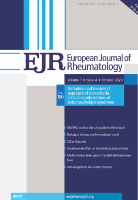
SEMINARS IN ARTHRITIS AND RHEUMATISM
Scope & Guideline
Unveiling the latest in arthritis and pain medicine.
Introduction
Aims and Scopes
- Rheumatic Disease Mechanisms:
Exploration of the underlying biological mechanisms of rheumatic diseases, including autoimmune responses, genetic predispositions, and inflammatory pathways. - Clinical Management Strategies:
Research on treatment efficacy, safety, and patient outcomes regarding various therapeutic approaches, including pharmacological and non-pharmacological interventions. - Patient-Centered Outcomes:
Focus on understanding patient-reported outcomes, quality of life assessments, and the psychosocial aspects of living with rheumatic diseases. - Epidemiological Studies:
Investigations into the prevalence, incidence, and risk factors associated with rheumatic diseases, providing insights into population health trends. - Innovative Diagnostic Tools:
Development and validation of new diagnostic methods, including imaging techniques and biomarkers, to enhance early detection and monitoring of rheumatic conditions. - Interdisciplinary Approaches:
Encouragement of collaboration across disciplines, integrating perspectives from immunology, genetics, and public health to address complex issues in rheumatology.
Trending and Emerging
- Machine Learning and AI Applications:
There is a growing interest in utilizing machine learning and artificial intelligence to predict treatment responses and outcomes in rheumatic diseases, enhancing personalized medicine approaches. - Patient Engagement and Involvement:
Research increasingly focuses on incorporating patient perspectives in clinical trials and treatment decisions, emphasizing the importance of patient-reported outcomes and shared decision-making. - Longitudinal and Real-World Data Studies:
An increase in studies utilizing real-world data and long-term cohort analyses to assess treatment effectiveness and disease progression in diverse populations. - Multimorbidity and Comorbid Conditions:
A trend towards exploring the impact of comorbidities on rheumatic disease outcomes, reflecting the increasing complexity of patient management in clinical practice. - Biomarkers and Precision Medicine:
Emerging research on biomarkers for disease diagnosis, prognosis, and treatment response, aiming to tailor therapeutic strategies to individual patient profiles.
Declining or Waning
- Traditional Pharmacological Approaches:
Research focusing solely on conventional drug therapies, such as methotrexate and NSAIDs, is becoming less prevalent as newer biologics and targeted therapies gain prominence. - Basic Science Studies:
There is a noticeable reduction in purely laboratory-based studies with limited clinical relevance, as the journal shifts towards studies that integrate clinical and translational research. - Single-Disease Focus Research:
Decreasing emphasis on studies that concentrate exclusively on one rheumatic disease; instead, there is a growing trend toward multi-disease analyses that explore shared mechanisms and treatments.
Similar Journals

Journal of Rheumatic Diseases
Advancing knowledge in rheumatology for a healthier tomorrow.Journal of Rheumatic Diseases, published by the Korean College of Rheumatology, stands as a pivotal platform in the field of rheumatology, contributing significantly to the advancement of knowledge and clinical practice since its inception. With an impact factor reflecting its esteemed position in the academic community, this open-access journal promotes accessibility to high-quality research, ensuring that groundbreaking discoveries are reachable to all stakeholders in the realm of rheumatic diseases. The journal has maintained its commitment to quality, evidenced by its ranking in the Q3 category for Rheumatology in 2023, and its presence among the top quartiles of medical research. Focusing on innovative therapeutic approaches, emerging diagnostic techniques, and comprehensive reviews, the Journal of Rheumatic Diseases seeks to foster collaboration and dialogue among researchers, clinicians, and students alike. For accessibility, the journal offers numerous articles since its transition to open access in 2017, thereby facilitating research dissemination across the globe. As it converges over the years from 2019 to 2024, the journal promises to be instrumental in shaping the future of rheumatic disease research, inviting contributions that inspire new frontiers in this essential field.

JOURNAL OF RHEUMATOLOGY
Exploring the Complexities of Rheumatic DiseasesJOURNAL OF RHEUMATOLOGY, published by the J Rheumatol Publ Co, stands as a distinguished platform within the fields of rheumatology and immunology since its inception in 1974. With an impressive impact evidenced by its 2023 rankings—Q1 in Rheumatology and Q2 in both Immunology and Allergy—the journal has secured its position as a vital resource for researchers and practitioners alike. The journal is dedicated to advancing clinical and experimental knowledge in the pathogenesis, diagnosis, and management of rheumatic diseases, providing a rich repository of peer-reviewed articles that drive innovation in treatment protocols and patient care. Although it operates under a subscription model, the journal remains accessible to a broad audience committed to advancing their understanding of these critical areas. Located in Toronto, Canada, it continues to attract contributions from leading experts globally, making it an essential read for anyone keen on staying at the forefront of rheumatological research and practice.

SCANDINAVIAN JOURNAL OF RHEUMATOLOGY
Connecting Scholars to Transform Rheumatological CareThe Scandinavian Journal of Rheumatology, published by Taylor & Francis Ltd, is a prestigious peer-reviewed journal dedicated to advancing research in the fields of rheumatology, immunology, and related disciplines. With an ISSN of 0300-9742 and an E-ISSN of 1502-7732, this journal has established itself as a vital platform for disseminating significant findings and innovative approaches in the management of rheumatic diseases since its inception in 1959. As a recognized scholarly outlet, it currently resides within the Q2 category for Medicine (miscellaneous) and ranks #39 out of 73 in Rheumatology according to the 2023 Scopus assessments. This reflects the journal's commitment to high-quality research and its relevance in the scientific community. Although it does not provide Open Access options, the journal's rigorous selection process ensures that only the most impactful research reaches its audience, making it a crucial resource for researchers, clinicians, and students engaged in the exploration of rheumatological and immunological challenges. The journal's broad scope encompasses ongoing studies, clinical trials, and reviews that aim to enhance understanding and treatment of rheumatic conditions, promoting collaboration and knowledge-sharing among professionals in the field.

International Journal of Rheumatology
Fostering excellence in rheumatology through open access.The International Journal of Rheumatology, published by HINDAWI LTD, serves as a vital resource for researchers and practitioners in the fields of rheumatology and immunology. Since its inception in 2009 as an Open Access journal, it has aimed to disseminate high-quality, peer-reviewed research to foster advancements in the understanding and treatment of rheumatic diseases. With an ISSN of 1687-9260 and E-ISSN of 1687-9279, the journal has become increasingly relevant, achieving a respectable Q3 ranking in both the Immunology and Rheumatology categories in 2023, and earning a Scopus rank of #27 out of 73 in Medicine Rheumatology. The journal's commitment to excellence is reflected in its wide-ranging scope, addressing current trends and innovations through empirical studies, reviews, and clinical insights. Its global readership, based in the United States and beyond, highlights the journal's importance in shaping the discourse within rheumatological research. As it converges through the years from 2010 to 2024, the International Journal of Rheumatology continues to be a cornerstone for sharing groundbreaking findings and fostering collaboration in the rheumatic disease community.

ZEITSCHRIFT FUR RHEUMATOLOGIE
Advancing knowledge in rheumatology since 1974.ZEITSCHRIFT FUR RHEUMATOLOGIE, published by Springer Heidelberg, serves as a vital platform in the field of rheumatology, providing researchers, clinicians, and students with cutting-edge findings and discussions related to the diagnosis, treatment, and management of rheumatic diseases. Since its inception in 1974 and continuing until 2024, this journal retains its commitment to disseminating significant scientific work within this specialized domain. Although it is currently categorized in the Q4 quartile for Rheumatology and ranks 47 out of 73 in Scopus, reflecting its burgeoning presence, the journal is dedicated to evolving and gaining prominence in the academic community. By offering valuable insights and fostering scholarly discourse, ZEITSCHRIFT FUR RHEUMATOLOGIE plays a crucial role in advancing rheumatology research and enhancing patient care practices worldwide. The journal presents an opportunity for its readers to engage with contemporary studies and enrich their understanding of rheumatic ailments.

Pediatric Rheumatology
Championing excellence in pediatric rheumatology research and practice.Pediatric Rheumatology is a leading peer-reviewed open access journal published by BMC, dedicated to disseminating high-quality research in the field of pediatric rheumatology. Since its inception in 2007, the journal has established itself as a vital resource for healthcare professionals, researchers, and students focused on pediatric immunology, rheumatology, and child health, maintaining an impressive Q1 ranking in Pediatrics and Q2 in Immunology and Allergy as well as Rheumatology for 2023. It is recognized for its impact on advancing knowledge and clinical practice, with significant contributions noted in various studies and case reports. With access options that embrace the ethos of open science, all articles published in Pediatric Rheumatology are freely available, promoting collaborative research and discussion among practitioners across the globe. The journal welcomes submissions that encapsulate innovative research, clinical trials, and reviews that address both current challenges and advancements within the pediatric rheumatology landscape.

Open Access Rheumatology-Research and Reviews
Unlocking the Future of Rheumatology, One Review at a Time.Open Access Rheumatology-Research and Reviews, published by DOVE MEDICAL PRESS LTD, is a distinguished journal that has been a vital part of the rheumatology field since its inception in 2009. With an ISSN of 1179-156X, this journal is dedicated to disseminating groundbreaking research and comprehensive reviews in the discipline of rheumatology, making it an essential resource for researchers, clinicians, and students alike. It boasts an impressive Q3 ranking in the Rheumatology category for 2023, reflecting its relevance and quality within a highly competitive landscape, where it ranks in the 51st percentile among its peers as indicated by the Scopus Ranks. As an open-access platform, it ensures that critical findings and insights are easily accessible to a global audience, promoting collaboration and knowledge sharing. The journal's scope includes a wide range of topics within rheumatology, aimed at advancing understanding and treatment of musculoskeletal disorders and autoimmune diseases. Its headquarters is located in New Zealand, positioning it as a key player in the international research community.

European Journal of Rheumatology
Empowering Knowledge for Global Rheumatology ExpertsEuropean Journal of Rheumatology is a premier, peer-reviewed journal that has been paving the way for innovative research and in-depth analysis in the field of rheumatology since its launch. Published by AVES, this Open Access journal has been accessible to researchers, professionals, and students worldwide since 2014, promoting the sharing of valuable knowledge on rheumatic diseases and their treatment. With an ISSN of 2147-9720 and an E-ISSN of 2148-4279, it provides a prominent platform for groundbreaking studies and clinical evaluations that bridge scientific discovery with practical application. The journal’s mission is to enhance the understanding of rheumatological conditions and facilitate advancements in therapeutic strategies, making it an essential resource for anyone devoted to the improvement of patient care in this dynamic field. The European Journal of Rheumatology is committed to upholding the highest standards of scholarly publishing and aims to foster collaboration among researchers and practitioners across Europe and beyond.

RHEUMATIC DISEASE CLINICS OF NORTH AMERICA
Navigating the complexities of rheumatology for better outcomes.Rheumatic Disease Clinics of North America is a premier journal published by W B Saunders Co-Elsevier Inc, dedicated to advancing the field of rheumatology through comprehensive and impactful research. With an ISSN of 0889-857X and an E-ISSN of 1558-3163, this esteemed publication has been disseminating knowledge since its inception in 1987, and continues to guide clinicians and researchers alike through its insightful articles and case studies. Positioned in the 2023 Q2 quartile for Rheumatology, it ranks #31 out of 73 journals in the Scopus category of Medicine _ Rheumatology, reflecting a commendable impact factor and relevance in the academic community. Although it does not offer open access options, the journal ensures that subscribers have access to cutting-edge research and reviews that address contemporary challenges and advancements in rheumatic disease. With its authoritative content, Rheumatic Disease Clinics of North America serves as a vital resource for those striving to improve patient care and clinical outcomes in the ever-evolving landscape of rheumatology research.

Modern Rheumatology
Navigating the Frontiers of RheumatologyModern Rheumatology is a premier journal dedicated to advancing the field of rheumatology through high-quality peer-reviewed research. Published by Oxford University Press, this journal reflects the latest developments in rheumatologic medicine, catering to researchers, clinicians, and students alike. With an H-Index highlighting its scholarly impact, Modern Rheumatology occupies a notable position, ranking Q2 in both the fields of Medicine and Rheumatology in 2023, and is listed among the top 25 journals in its category by Scopus. Spanning from the year 2000 to 2024, the journal features a diverse array of topics aimed at addressing current challenges and innovations in the field. Although it does not offer Open Access, it provides essential insights for professionals seeking to stay abreast of evolving treatment modalities and research breakthroughs. Located in the heart of the United Kingdom, Modern Rheumatology is a vital resource for anyone committed to enhancing the understanding and treatment of rheumatic diseases.